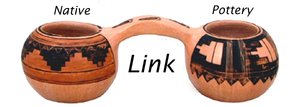
Hopi Indian basket, plaque, wicker by Joan Mononoye. 13" diameter #B190
Hopi Indian Basket, Plaque, Wicker,
Traditional 3rd Mesa Style.
Blue, Gold, Red. 13" diameter.
Joan Mononoye
US$580
Free Shipping
within the 48 mainland United States


Additional Info
Fellow collector/dealer,
Steve Elmore writes:
"Hopi baskets are truly the last ethnographic baskets being made in Native America and remain an essential component of traditional Hopi culture even today."
"...the baskets are also essential to the Hopi carrying on their traditional way of life, and the baskets have many social and ceremonial functions besides that of mere utility. For example, certain women’s dances require each dancer to have a basket to participate, and of course, many of the kachina ceremonies use traditional baskets. Hopi baskets also serve as a kind of currency within the community. They are traded, used for paying obligations, and often sold to traders and collectors for real currency. Significantly, the baskets are essential in each traditional Hopi wedding, as the bride’s family pays back the groom’s family for making the bride’s wedding clothes with baskets. This ‘payback’ can take a year or more to complete and require the making of up to a 100 new baskets. The size of the payback is a real point of pride for the bride’s family as well as all the individual women who wove the baskets. Carrying on such traditions and ceremonies are one of many ways that the Hopi are able to preserve their distinct culture. are two principal kinds of baskets: wickers which are made on Third Mesa and coils which come from Second Mesa villages. Coils are considered sturdier and harder to make than wickers which
have a pleasing texture to their sweeping openness. Kachina images, as usual, command higher prices and more attention. The wickers are made from scrub sumac and the coils from yucca and galleta grass."
Quotation from Steve Elmore is published material and does not constitute endorsement or confirmation by Steve Elmore of any estimates relative to this specific basket. His opinion is provided for general information only.
